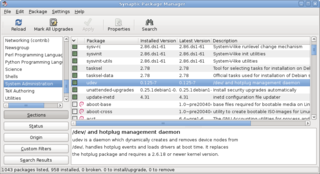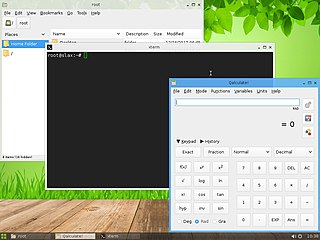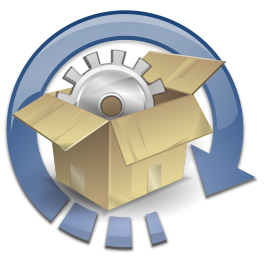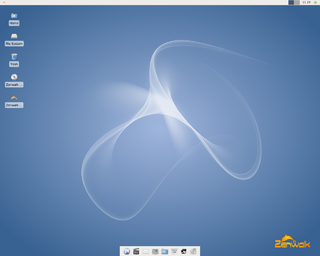| Original author(s) | Pancrazio 'Ezio' de Mauro |
|---|---|
| Developer(s) | Felipe Sánchez |
| Stable release | 1.6.1 / November 1, 2006 |
| Platform | Unix-like |
| Type | Software management |
| License | GNU General Public License |
| Website | asic-linux |
Installwatch is a program designed to make it easier to catalog and maintain software installed from source code. Originally developed as a stand-alone project, Installwatch now exists primarily as a component of CheckInstall.
Installwatch was originally written by Pancrazio 'Ezio' de Mauro in 1998, but development was later taken over by Felipe Sánchez. [1]
Installwatch allows the user to monitor what files and directories are created during the installation of a software package in real-time. This allows the user to know exactly what has been installed on their system for the purposes of documentation and later removal of the software. [1]
When used on its own Installwatch is of limited usefulness, as it can only create a log of the installation process. Because of this, Felipe Sánchez created CheckInstall; which takes the information generated by Installwatch and uses it to create an installable package which can be used on any Linux distribution that makes use of Debian, Slackware, or Red Hat package management systems.
The use of CheckInstall has largely superseded that of Installwatch alone, and as such Installwatch has now been merged with the CheckInstall distribution. Older stand-alone versions of Installwatch still remain primarily for historical and educational purposes.
At present, the version of Installwatch packaged with CheckInstall is incompatible with the current version of the GNU coreutils (Core Utilities). Because of this, Installwatch can't monitor any changes made with the coreutils, rendering its logs incomplete. Depending on the software package, this may completely invalidate the information provided by Installwatch and thus any program that depends on it (such as CheckInstall).
This issue was documented in the Slackware 12 changelog, and prompted CheckInstall's removal from that distribution. [2] On August 3, 2007, the problem was further explained and detailed by Felipe Sánchez on the CheckInstall mailing list. [3]
An updated version of CheckInstall was never delivered to address the issue, and a workaround is suggested. [4]

A Linux distribution is an operating system made from a software collection that includes the Linux kernel and often a package management system. They are often obtained from the website of each distribution, which are available for a wide variety of systems ranging from embedded devices and personal computers to servers and powerful supercomputers.

Slackware is a Linux distribution created by Patrick Volkerding in 1993. Originally based on Softlanding Linux System (SLS), Slackware has been the basis for many other Linux distributions, most notably the first versions of SUSE Linux distributions, and is the oldest distribution that is still maintained.

A package manager or package-management system is a collection of software tools that automates the process of installing, upgrading, configuring, and removing computer programs for a computer in a consistent manner.

Slax is a LiveCD Linux distribution developed by Tomáš Matějíček and based on upstream customizable Linux distributions. Packages can be added by apt package manager or can be prepared as modules. The tagline for Slax refers to itself as "your pocket operating system".

Windows Installer is a software component and application programming interface (API) of Microsoft Windows used for the installation, maintenance, and removal of software. The installation information, and optionally the files themselves, are packaged in installation packages, loosely relational databases structured as COM Structured Storages and commonly known as "MSI files", from their default filename extensions. The packages with the file extensions mst contain Windows Installer "Transformation Scripts", those with the msm extensions contain "Merge Modules" and the file extension pcp is used for "Patch Creation Properties". Windows Installer contains significant changes from its predecessor, Setup API. New features include a GUI framework and automatic generation of the uninstallation sequence. Windows Installer is positioned as an alternative to stand-alone executable installer frameworks such as older versions of InstallShield and NSIS.
ZipSlack was a specially compiled release of the Slackware Linux distribution that was designed to be lightweight and portable. It was distributed in a ZIP archive along with the Slackware release.

slapt-get is an APT-like package management system for Slackware. Slapt-get tries to emulate the features of Debian's (apt-get) as closely as possible.

VectorLinux, abbreviated VL, was a Linux distribution for the x86 platform based on the Slackware Linux distribution, originally developed by Canadian developers Robert S. Lange and Darell Stavem. Since version 7 the Standard Edition is also available for the x86-64 platform, known as VLocity64 7.

Autopackage is a free computer package management system aimed at making it simple to create a package that can be installed on all Linux distributions, created by Mike Hearn around 2002.

Zenwalk GNU/Linux is a desktop-focused Linux distribution founded by Jean-Philippe Guillemin. It is based on Slackware with very few modifications at system level making it 100% compatible with Slackware. It aims to be a modern, multi-purpose Linux distribution by focusing on internet applications, multimedia and programming tools. It comes with many specialized tools and is designed for beginners and advanced users alike, as it offers system configuration via both graphical tools and the command line.

Frugalware Linux is a general-purpose Linux distribution designed for intermediate users who are familiar with command-line operations. Early versions were based on Slackware, but it later became an independently developed distribution. Frugalware made use of the Pacman package management system from Arch Linux.
KateOS was a Linux distribution originally based on Slackware. It was designed for intermediate users. Its package management system used so called TGZex (.tgz) packages, which unlike Slackware packages support dependency tracking (optional), internationalized descriptions, and were designed for ease of update. There were two native tools for package management: PKG and Updateos. The last version released was KateOS III (3.6), including as a Live CD, in 2007.
BioLinux is a term used in a variety of projects involved in making access to bioinformatics software on a Linux platform easier using one or more of the following methods:

Software remastering is software development that recreates system software and applications while incorporating customizations, with the intent that it is copied and run elsewhere for "off-label" usage. The term comes from remastering in media production, where it is similarly distinguished from mere copying.
MCC Interim Linux is a Linux distribution first released in February 1992 by Owen Le Blanc of the Manchester Computing Centre (MCC), part of the University of Manchester. It was the first Linux distribution created for computer users who were not Unix experts and featured a menu-driven installer that installed both the kernel and a set of end-user and programming tools.
CheckInstall is a computer program for Unix-like operating systems which eases the installation and uninstallation of software compiled from source by making use of package management systems. After software compilation it can automatically generate a Slackware-, RPM-, or Debian-compatible package that can later be cleanly uninstalled through the appropriate package manager.

Wubi is a free software Ubuntu installer, that was the official Windows-based software, from 2008 until 2013, to install Ubuntu from within Windows, to a single file within an existing Windows partition.

NimbleX is a small Slackware-based Linux distribution optimized to run from a CD, USB drive or a network environment. NimbleX has been praised for how fast it boots, as well as for its small disk footprint, which is considered surprising for a distribution using KDE as desktop environment. NimbleX was also remarked for its website that allows users to generate custom bootable images by using a web browser. It was also covered in mainstream Romanian press as the first Linux distribution put together by a Romanian.

Salix OS is a multi-purpose Linux distribution based on Slackware.

Porteus is a portable operating system based on Slackware. It does not require installation and can be run from fixed and removable media, such as a USB flash drive or compact disc.